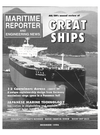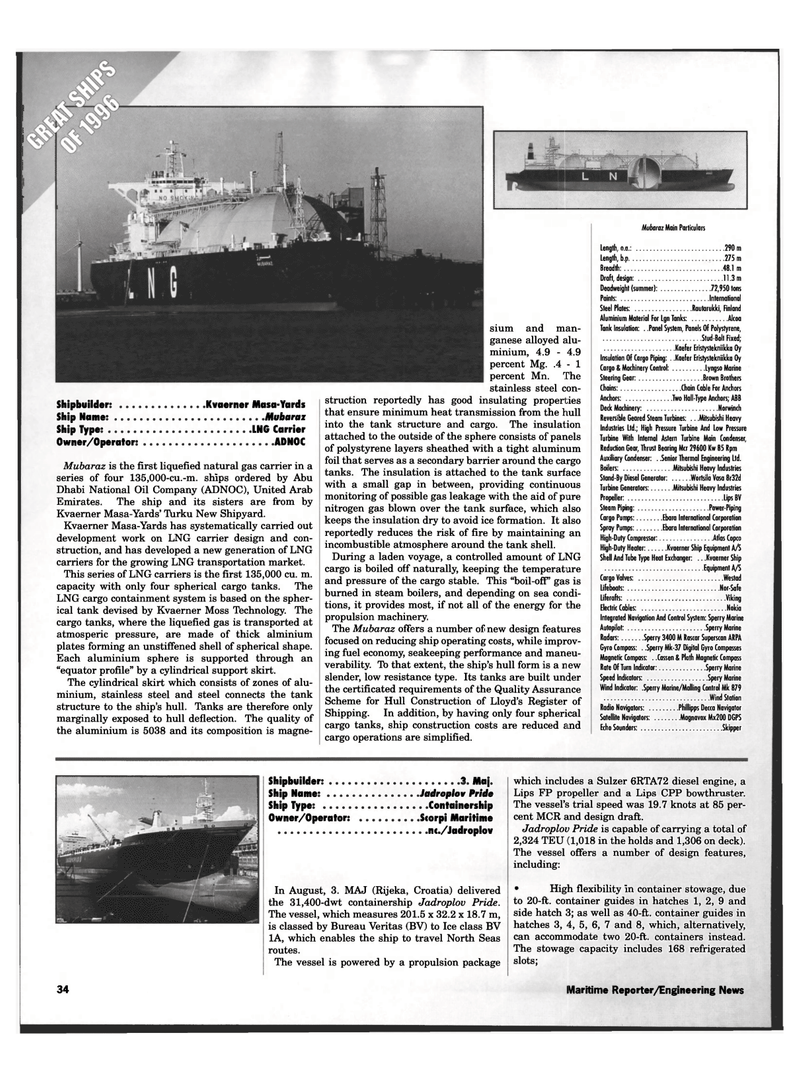
Page 32: of Maritime Reporter Magazine (December 1996)
Read this page in Pdf, Flash or Html5 edition of December 1996 Maritime Reporter Magazine
Mubaraz Main Particulars
Length, o.a.: 290 m
Length, b.p 275 m
Breadth: 48.1 m
Draft, design: 11.3m
Deadweight (summer): 72,950 tons
Paints: International
Steel Plates: Rautarukki, Finland
Aluminium Material For Lgn Tanks: Alcoa
Tank Insulation: . .Panel System, Panels Of Polystyrene,
Stud-Boll Fixed;
Kaefer Eristystekniikka Oy
Insulation Of Cargo Piping: . .Kaefer Eristystekniikka Oy
Cargo & Machinery Control: Lyngso Marine
Steering Gear: Brown Brothers
Chains: Chain Cable For Anchors
Anchors: Two Hall-Type Anchors; ABB
Deck Machinery: Norwinch
Reversible Geared Steam Turbines: .. .Mitsubishi Heavy
Industries Ltd.; High Pressure Turbine And Low Pressure
Turbine With Internal Astern Turbine Main Condenser,
Reduction Gear, Thrust Bearing Mcr 29600 Kw 85 Rpm
Auxiliary Condenser: . .Senior Thermal Engineering Ltd.
Boilers: Mitsubishi Heavy Industries
Stand-By Diesel Generator: Wortsila Vasa 8r32d
Turbine Generators: Mitsubishi Heavy Industries
Propeller: Lips BV
Steam Piping: Power-Piping
Cargo Pumps: Ebara International Corporation
Spray Pumps: Ebara International Corporation
High-Duty Compressor: Atlas Copco
High-Duty Heater: Kvaerner Ship Equipment A/S
Shell And Tube Type Heat Exchanger: .. .Kvaerner Ship
Equipment A/S
Cargo Valves: Westad
Lifeboats: Nor-Safe
Liferafts: Viking
Electric Cables: Nokia
Integrated Navigation And Control System: Sperry Marine
Autopilot: Sperry Marine
Radars: Sperry 3400 M Rascar Superscan ARPA
Gyro Compass: . .Sperry Mk-37 Digital Gyro Compasses
Magnetic Compass: . .Cassen & Plath Magnetic Compass
Rate Of Turn Indicator: Sperry Marine
Speed Indicators: Spery Marine
Wind Indicator: .Sperry Marine/Mailing Control Mk 879
Wind Station
Radio Navigators: Phillipps Decca Navigator
Satellite Navigators: Magnavox Mx200 DGPS
Echo Sounders: Skipper
Shipbuilder: Kvaerner Masa-Yards
Ship Name: Mubaraz
Ship Type: LNG Carrier
Owner/Operator: ADNOC
Mubaraz is the first liquefied natural gas carrier in a series of four 135,000-cu.-m. ships ordered by Abu
Dhabi National Oil Company (ADNOC), United Arab
Emirates. The ship and its sisters are from by
Kvaerner Masa-Yards' Turku New Shipyard.
Kvaerner Masa-Yards has systematically carried out development work on LNG carrier design and con- struction, and has developed a new generation of LNG carriers for the growing LNG transportation market.
This series of LNG carriers is the first 135,000 cu. m. capacity with only four spherical cargo tanks. The
LNG cargo containment system is based on the spher- ical tank devised by Kvaerner Moss Technology. The cargo tanks, where the liquefied gas is transported at atmosperic pressure, are made of thick alminium plates forming an unstiffened shell of spherical shape.
Each aluminium sphere is supported through an "equator profile" by a cylindrical support skirt.
The cylindrical skirt which consists of zones of alu- minium, stainless steel and steel connects the tank structure to the ship's hull. Tanks are therefore only marginally exposed to hull deflection. The quality of the aluminium is 5038 and its composition is magne- sium and man- ganese alloyed alu- minium, 4.9 - 4.9 percent Mg. .4 - 1 percent Mn. The stainless steel con- struction reportedly has good insulating properties that ensure minimum heat transmission from the hull into the tank structure and cargo. The insulation attached to the outside of the sphere consists of panels of polystyrene layers sheathed with a tight aluminum foil that serves as a secondary barrier around the cargo tanks. The insulation is attached to the tank surface with a small gap in between, providing continuous monitoring of possible gas leakage with the aid of p ure nitrogen gas blown over the tank surface, which also keeps the insulation dry to avoid ice formation. It also reportedly reduces the risk of fire by maintaining an incombustible atmosphere around the tank shell.
During a laden voyage, a controlled amount of LNG cargo is boiled off naturally, keeping the temperature and pressure of the cargo stable. This "boil-off" gas is burned in steam boilers, and depending on sea condi- tions, it provides most, if not all of the energy for the propulsion machinery.
The Mubaraz offers a number of new design features focused on reducing ship operating costs, while improv- ing fuel economy, seakeeping performance and maneu- verability. To that extent, the ship's hull form is a new slender, low resistance type. Its tanks are built under the certificated requirements of the Quality Assurance
Scheme for Hull Construction of Lloyd's Register of
Shipping. In addition, by having only four spherical cargo tanks, ship construction costs are reduced amd cargo operations are simplified.
Shipbuilder: 3. Maj.
Ship Name: Jadroplov Pride
Ship Type: Containership
Owner/Operator: Scorpi Maritime n«./Jadroplov
In August, 3. MAJ (Rijeka, Croatia) delivered the 31,400-dwt containership Jadroplov Pride.
The vessel, which measures 201.5 x 32.2 x 18.7 m, is classed by Bureau Veritas (BV) to Ice class BV 1A, which enables the ship to travel North Seas routes.
The vessel is powered by a propulsion package which includes a Sulzer 6RTA72 diesel engine, a
Lips FP propeller and a Lips CPP bowthruster.
The vessel's trial speed was 19.7 knots at 85 per- cent MCR and design draft.
Jadroplov Pride is capable of carrying a total of 2,324 TEU (1,018 in the holds and 1,306 on deck).
The vessel offers a number of design features, including: • High flexibility in container stowage, due to 20-ft. container guides in hatches 1, 2, 9 and side hatch 3; as well as 40-ft. container guides in hatches 3, 4, 5, 6, 7 and 8, which, alternatively, can accommodate two 20-ft. containers instead.
The stowage capacity includes 168 refrigerated slots; 34 Maritime Reporter/Engineering News

 31
31

 33
33
